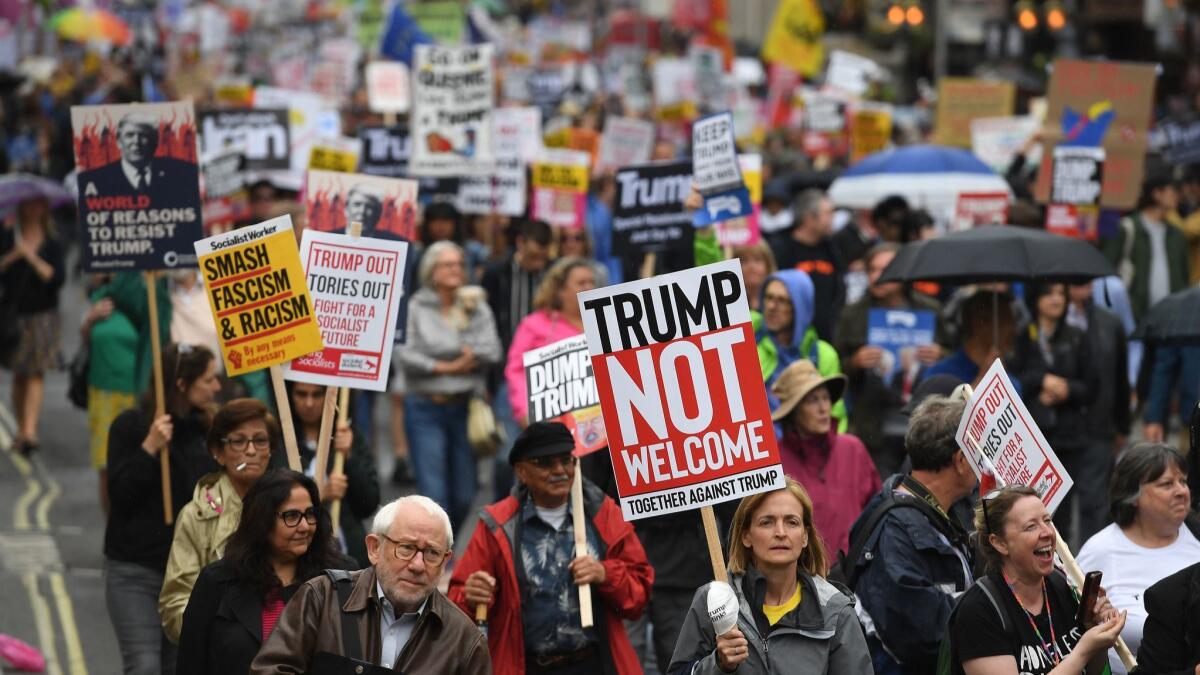Column: We fled the country to escape news about Trump. We failed

- Share via
Reporting from Ameno, Italy — I launched an experiment last week: I tried to unplug from the tumult of President Trump’s Washington and the Democratic presidential race.
For seven days, I resolved to stay away from Twitter and Facebook, watch no television, and see if the world felt any calmer.
OK, I cheated a little. My wife and I headed for the lakes of northern Italy. We stayed in an old stone house with no TV in a hilltop village without easy internet access. We couldn’t stay glued to Twitter if we tried.
So we took walks in the Alps overlooking Lago Maggiore. We ate long lunches and lingered in sidewalk cafes. We read entire books — novels for her, history for me.
I learned three things.
First, it’s good to disconnect from social media. The signal-to-noise ratio is simply too low.
Trump’s tweets lose their freshness after 24 hours. You can always catch up later — if you need to see them at all. Last week, I’m told, he got angry at Bette Midler; so what? Even when he tweets out new policies, he often doesn’t follow through.
But Trump isn’t the only offender. Your friends’ Facebook and Instagram postings are rarely urgent. Checking in once a week or so — slowing down to the pace of snail mail, in effect — works fine.
Second — and this is painful for a news junkie to admit — even in these chaotic times, the world usually doesn’t change very quickly.
Before we left for Italy, I was paying obsessive attention to the Democratic campaign. Back then, Joe Biden was on top of the polls, Bernie Sanders was second, Elizabeth Warren was rising, and most other candidates were gasping for air.
A whole week of campaigning, speechifying and gaffe-ing hasn’t changed the lineup appreciably. Actually, not much is likely to change before the first televised debates on June 26 and 27. Even then, many voters won’t tune in until later this year or when the actual voting begins next year.
As President Obama’s former strategist David Axelrod said recently, this race is a marathon — but we journalists are focused on who’s ahead every hundred yards. You can safely ignore most of those split times; the race has barely started.
Third, U.S. politics isn’t the center of the universe. The rest of the world has barely noticed the start of our primary season.
Our well-read Italian friends, frequent visitors to the United States, asked us who was running against Trump. The only names they knew were Biden and Sanders.
“Are any women running?” our schoolteacher friend Lala Orsini asked innocently. I attempted to name all 23 candidates, including six women, to demonstrate the glorious variety of our democracy. Eyes glazed over well before I reached Amy Klobuchar.
One reason for Europeans’ tepid interest in our melodrama is that they have big troubles of their own.
In much of Europe, the Great Recession of a decade ago never quite ended. Italy’s unemployment rate is stuck near 10%; the jobless rate for people under 25 was recently estimated at a brutal 31%. Small wonder that their traditional political parties have fallen out of favor.
All four of Western Europe’s most populous countries — Germany, France, Britain and Italy — are mired in different versions of the same crisis of democracy.
In last month’s election for the European Union parliament, almost all the traditional parties lost, from Britain’s center-right Conservatives (who came in fifth in the U.K.) to Germany’s center-left Social Democrats (who came in third in Germany).
The winners were parties that once would have been considered fringe organizations: Nigel Farage’s Brexit Party in Britain, the Greens in Germany, Matteo Salvini’s far-right Lega in Italy.
If that sounds incoherent, it is. But to Europeans, one part is all too clear: The delegitimization of traditional parties is bad news, even if the parties deserved it.
If Europe’s political center cannot hold, many fear a future dominated by extremists and demagogues — the kind of destructive politics that condemned the continent to two wars in the first half of the 20th century.
That’s why Europeans built so many boring but effective multinational organizations like the European Union: They want to make their continent as peaceful, stable and dull as possible — because the alternative is infinitely worse. The poignant ceremonies to mark the 75th anniversary of D-day reminded us that the consequences would touch the United States as well.
Trump isn’t helping the cause of European stability. As we saw in his visit to the United Kingdom and France, he often appears bizarrely intent on hurting it.
He’s embraced right-wing leaders, questioned the NATO alliance that helped keep the peace since World War II, and rooted publicly for Britain to quit the European Union without an exit agreement, which would mean a chaotic, ugly, angry break.
“Let’s not talk about Europe,” Lala’s husband, Carlo, said dolefully over a dinner of grilled fish from the lake. “Trump is going to win again, right?”
Way too early to know, I assured him. Four years ago today, Trump hadn’t even entered the 2016 presidential race. Election day is still a long way off. Anything is possible.
Which means that next year, for a real vacation from the news, we may have to consider Antarctica.
More to Read
Get the L.A. Times Politics newsletter
Deeply reported insights into legislation, politics and policy from Sacramento, Washington and beyond. In your inbox twice per week.
You may occasionally receive promotional content from the Los Angeles Times.











